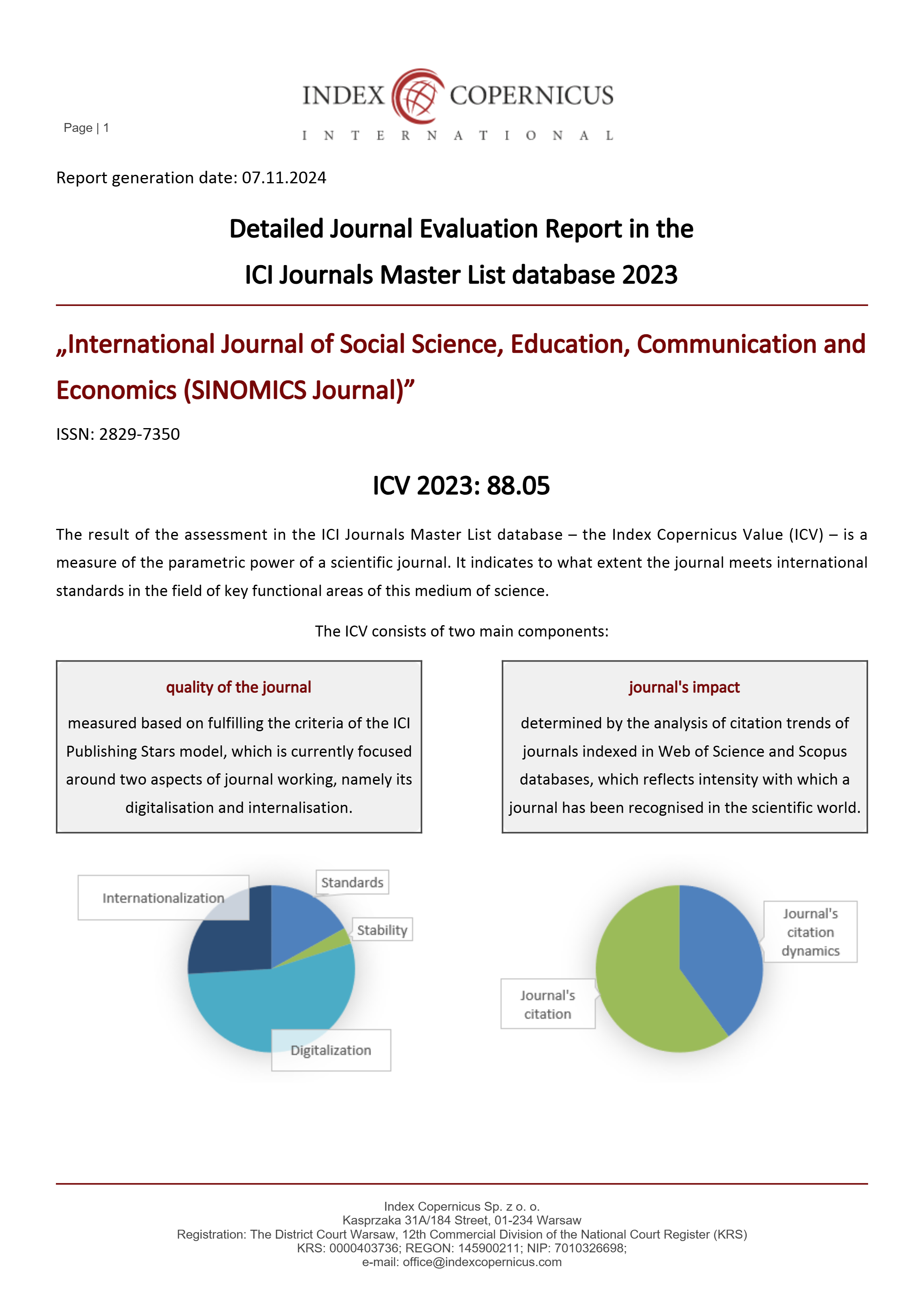Fraud Risk Management Approach to Detterence Fraud at Banks in Indonesia
Main Article Content
Doni Indrianto
Joseph Antonio Young
Nelson Ng
The purpose of this study is to be able to provide information to practitioners to evaluate the understanding and awareness of their bank employees regarding the fraud risk management approach in fraud prevention at banks in Indonesia. This study uses a qualitative descriptive analysis method. This method is used with the aim of describing research results in narrative form. In this study the data used are non-numeric secondary data. Non-numeric secondary data used in the study were found by searching for supporting information for this research from reports, journals, books and websites. The results of this study are that the fraud risk management approach can prevent fraud in the fraud triangle model, as well as detect and respond to fraud that occurs in banks.
ACFE. (2016). Report to the Nations on Occupational Fraud & Abuse: Global Fraud Study. Association of Certified Fraud Examiners. https://www.acfe.com/rttn2016/docs/2016-report-to-the-nations.pdf
ACFE. (2018). Report to the Nation’s 2018: Global Study on Occupational Fraud and Abuse. Association of Certified Fraud Examiners. https://s3-us-west-2.amazonaws.com/acfepublic/2018-report-to-the-nations.pdf
Adamu AHMED, A., Adamu SAIDU, A., & Hussein KAWURE, J. . (2022). The Roles of Central Bank Digital Currency over Physical Currency. International Journal of Social Science, Education, Communication and Economics (SINOMICS JOURNAL), 1(2), 75–92. https://doi.org/10.54443/sj.v1i2.10
Ayu Wardani, C., & Sulhani, S. (2017). Analisis Faktor-Faktor Yang Mempengaruhi Penerapan Whistleblowing System Di Indonesia. Jurnal ASET (Akuntansi Riset), 9(1), 29–43. https://doi.org/10.17509/jaset.v9i1.5255
Bank Indonesia. (2011). Penerapan Strategi Anti Fraud bagi Bank Umum. Journal of Controlled Release, 39, 1–7.
Christian, N., & Resnika. (2022). Penggunaan Teknik Akuntansi Forensik dalam Pendeteksian dan Pencegahan Occupational Fraud: Kajian Literatur. Jurnal Maneksi, 11(1), 287–299.
Christian, N., & Veronica, J. (2022). Dampak Kecurangan Pada Bidang Keuangan Dan Non-Keuangan Terhadap Jenis Fraud Di Indonesia. Jurnal Riset Akuntansi Mercu Buana, 8(1), 91–102.
Christian, N., & Visakha, B. (2021). Analisis teori fraud pentagon dalam mendeteksi fraud pada laporan keuangan perusahaan yang terdaftar di bursa efek Indonesia. Conference on Management, Business, Innovation, Education and Social Sciences, 1(1), 1325–1342.
Clinard, M. B., & Cressey, D. R. (1954). Other People’s Money: A Study in the Social Psychology of Embezzlement. American Sociological Review, 19(3), 362. https://doi.org/10.2307/2087778
CIMA, 2009. Fraud risk management: A guide to good practice, Chartered Institute of Management Accountants.
Cressey, D. (1950). The Criminal Violation of Financial Trust. 15(6), 738–743.
Dewi, P. P., Suwantari, N. P. E., & Pradhana, I. P. D. (2021). Faktor-Faktor Pencegahan Fraud pada Lembaga Perbankan. E-Jurnal Akuntansi, 31(6), 1592. https://doi.org/10.24843/eja.2021.v31.i06.p19.
Fadli, M. R. (2021). Memahami desain metode penelitian kualitatif. Humanika, 21(1), 33–54. https://doi.org/10.21831/hum.v21i1.38075
Fligstein, N. & Roehrkasse, A.F. (2016). The Causes of Fraud in the Financial Crisis of 2007 to 2009: Evidence from the Mortgage-Backed Securities Industry. American Sociological Review, 81 (4), 617-643. https://doi.org/10.1177/0003122416645594
Kingsley, K.M. (2015). Fraud and Corruption Practices in the Public Sector: The Cameroon Experience. Research Journal & Accounting, 6 (4), 203-209. https://core.ac.uk/download/pdf/234630537.pdf
Higson, R. K. and A. (2012). Fraud Triangle. Journal of Emerging Trends in Economics and Management Sciences, 3(3), 191–195.
Meliana, M., & Hartono, T. R. (2019). Fraud Perbankan Indonesia: Studi Eksplorasi. Prosiding Seminar Nasional Pakar Ke 2, 2, 1–7. https://trijurnal.trisakti.ac.id/index.php/pakar/article/download/4335/3452.
Murdock, D. H. (2018). Association of Certified Fraud Examiners (ACFE). Auditor Essentials, 7–10. https://doi.org/10.1201/9781315178141-3
Nwankwo, O. (2013). Implications of Fraud on Commercial Banks Performance in Nigeria. International Journal of Business and Management, 8(15). https://doi.org/10.5539/ijbm.v8n15p144
Mwangi, S. W., & Ndegwa, J. (2020). The Influence of Fraud Risk Management on Fraud Occurrence in Kenyan listed Companies. International Journal of Finance & Banking Studies (2147-4486), 9(4), 147–160. https://doi.org/10.20525/ijfbs.v9i4.943
Owojori, A. A., Akintoye, I. R., & Adidu, F. A. (2011). The challenge of risk management in Nigerian banks in the post consolidation era. Journal of Accounting and Taxation, 3(2), 23–31. http://www.academicjournals.org/JAT
Simbolon, R., Ahmad, N., & Elviani, S. (2018). Are the Model of Fraud Triangle Elements Sufficient enough to Prevent Fraud? Evidence in North Sumatra Province. Advances in Social Science, Education and Humanities Research, 208, 356-359. https://doi.org/10.2991/icssis-18.2019.73
Sudarmanto, & Eko. (2020). Manajemen Risiko: Deteksi Dini Upaya Pencegahan Fraud. Jurnal Ilmu Manajemen, 9(2), 107–121.
Wahyu Ida Nurcahyaningsih, T. ., Rahayu, SE, A. ., & Drs. Purwiyanta, M.Si, D. P. M. (2022). Pengaruh Harga Internasional Batubara, Harga Internasional Minyak Bumi dan Gross Domestic Product Per Capita Terhadap Permintaan Ekspor Batubara Indonesia Ke Jepang Tahun 2000-2020. SINOMIKA Journal: Publikasi Ilmiah Bidang Ekonomi Dan Akuntansi, 1(4), 933–950. https://doi.org/10.54443/sinomika.v1i4.457
Winda, M., Herny Susanti, P., & Ayu Putri Trarintya, M. (2022). The Role of Commitment to Mediate Effect of Motivation on The Performance of Waste Bank Managers in The City of Denpasar. International Journal of Social Science, Education, Communication and Economics (SINOMICS JOURNAL), 1(2), 115–130. https://doi.org/10.54443/sj.v1i2.12










